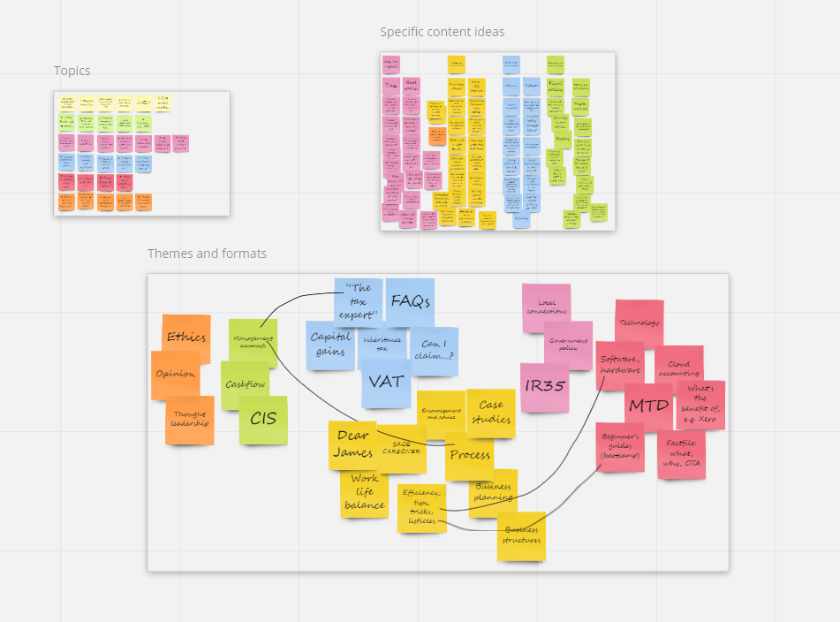When you’re convinced by the benefits of content marketing but simply don’t know where to start, a content strategy workshop is the solution.
Starting at the end and working back, accounting firms that undertake a workshop with me or one of my colleagues walk away with a package of solid, practical stuff.
We don’t have any ideas for content! Workshops typically generate between 60 and 75 ideas for specific items of content – enough for at least one blog post per week, if you’re so inclined.
When should we post what? We work together on a calendar that sets out when key items of content should be published, taking into account seasonal events, the political calendar, tax year and anything unique to your firm, target sectors or region.
How do we make our content feel like us? After spending a day with you, we’ll be able to produce documents setting out your tone of voice and providing concrete examples of copywriting.
What’s the point of content? As well as the above, the workshop report provides notes on your competitors and what you want your content to achieve in relation to your business and marketing goals.
From my point of view, though, the process we go through to get those outputs is where the real value lies.
If you look at PracticeWeb’s biggest recent successes, they’re all built on this kind of important upfront strategy work – brand strategy first, with content strategy flowing out of it.
For me, and the other creative types at PracticeWeb, spending time with clients, listening to them express themselves, is invaluable.
For one thing, if your job is to write on behalf of someone else, there’s nothing like spending five or more hours in their company. You hear their accent, the rhythm of their speech and pick up the little turns of phrase that make them sound like them.
You also get a strong sense of what they care about and how they really feel, often from unguarded moments during the tea-break or when they’re thinking aloud during one of the exercises.
For example, hearing Simon Thandi from UK Landlord Tax say, with real passion, “I love being a landlord – I love it!” was one of the key moments in that entire project.
What’s on the agenda?
A typical workshop runs from 10am to 4pm with a few scheduled breaks – which you’ll need, by the way, because getting creative can be quite hard work, especially if you’re not used to it.
After introductions and scene-setting is out of the way, we’ll spend some time looking at the competition, as well as firms you admire. What are they doing well? What are they doing badly? What is it about their approach to content you love, or hate? It’s a way of gently easing into the creative mindset, really.
I’ll be honest, the first 30 minutes can be quite tough. People are often reluctant, a bit quiet and worried about embarrassing themselves. But that soon changes.
Next, we move on to defining the purpose of your content. With in-person workshops, this would involve a lot of Post-Its and Sharpie pens. For now, we do all this using online tools – and, actually, they’re great, it turns out.
Again, this is about moving another step towards the heavy creativity phase of the session. The whole idea is to use facilitation techniques to get you suggesting ideas, rather than me dictating them. It’s also about making sure we’re not doing content for content’s sake.
By this point, energy levels in the room have usually started to come up. Once people realise there’s no such thing as a daft idea or silly question, they begin to open up.
The next exercise can be make or break: we work together to come up with a content strategy statement. This is like a mission statement for your content – who is it aimed at, what will it convey, and what will it do for those who consume it. There’s a template with gaps to fill in. As a writer, what I love is seeing non-writers get into my headspace, choosing each word carefully, debating their meaning, making multiple passes until it’s just right.
Honestly, this can be difficult and, believe it or not, it sometimes gets emotional. My favourite workshops are when we sweat our way to a beautifully crafted statement and someone says, “I love that – I’m going to have it printed on my business cards.”
After this, things get less abstract. Everyone’s fired up, focused and thinking a bit more like a marketer.

This year, we’ve had to use online Post-It note tools to run workshops – in this case, Miro.
In the final stretch, we go back to the Post-Its to work out:
- Top-level themes, e.g. Making Tax Digital.
- Specific content items that will allow you to talk about those themes to your ideal clients.
This is basically a blizzard of ideas and my favourite part. It’s when you see people who were quiet and shrugging three hours earlier shouting out suggestions, egging each other on and getting excited about the potential of the project.
If ideas are slow to come, I’ve got some tricks and techniques for eliciting interesting stuff. For example, I’ll ask questions like
“What’s the question clients most often ask you?”
or
“What’s the daftest thing one of your clients has tried to claim as a business expense?”
At the very end, we spend a few minutes thinking about dates and deadlines. For example, one client that worked mostly with farmers in rural Wales wanted to make sure they posted content around the county agricultural show. Others might want to emphasise the start of the tourist season. And so on.
Then I let everyone go and spend a few days writing it all up, fleshing out the ideas and filling in the gaps, before sending it over for sign-off. This will usually include putting together the first draft of a copywriting toolkit and tone of voice guide, too.
It’s worth saying, though, that we customise the workshop for each client depending on various things such as whether they’ve done brand strategy work or not; whether we have an existing relationship; and any market research we might have run on their behalf.
Looking for content that
gets results?
Our results-focused content marketing is designed to cut through noise, nurture sales prospects and build your firm’s reputation.
The quick-fix version
Not every client is in a position to pay for the full workshop process, or to find a day to focus on their brand and content strategy.
In the past year, we’ve developed a system for splitting the workshop into two or even three sessions, though it’s not ideal.
We’ve also got a budget version of the process based around a one-hour consultation phone call. As always, you get what you pay for: the content calendar and copywriting toolkit won’t be based on the same deep understanding of your accountancy firm.
It’s certainly better than nothing, however, and we know that clients who take this step often upgrade to the full process when they can afford to do so.
Can’t you just do it for us?
Every now and then, a client will say they don’t want to do any creative workshopping at all. They just want us to get on with writing content and planning blog posts for the next year based on the information we already have.
If they’re suitably easy-going, if we at least have some information to go on, we can usually come up with something that will do the job.
Usually, though, this doesn’t work particularly well because we’re left with no choice but to make assumptions or simply guess what the client might like. To do our best work we need some input.
To get a practical, detailed content strategy for your firm, get in touch.




